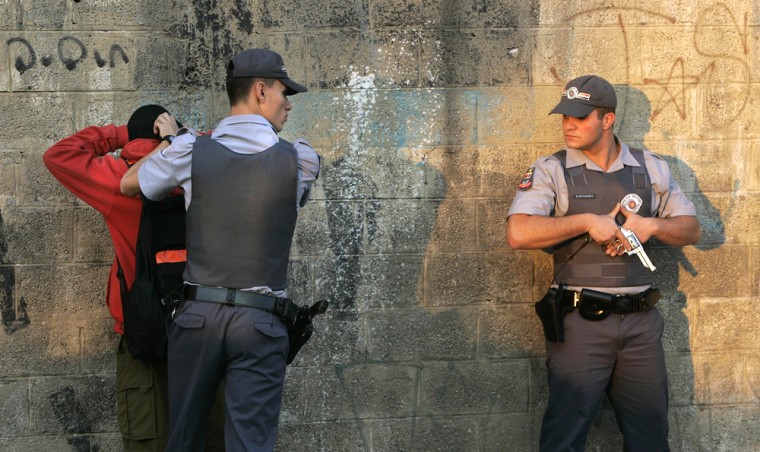Police were frisking motorists and searching for gang suspects in Sao Paulo on Friday even as violence that killed 170 people over the last week appeared to subside.
But the fear that gripped the city of 18 million during the unprecedented crime spree remained. Many residents said they worried similar gang attacks could re-erupt, with some saying the violence only highlighted a public-security system that broke down decades ago.
Police on Friday said that for the first night in a week they had no confrontations with members of the ruthless First Capital Command gang, or PCC, that launched the strikes in anger over last week's transfer of gang leaders to a remote lockup.
The death toll from daily gunbattles between police and suspected criminals, remained Friday at 170 people: 107 suspected criminals, 41 police and prison guards, 18 inmates and four civilians, police said.
"Thank God, we're getting back to normal," Col. Elizeu Eclair, head of Sao Paulo's state police, told Globo TV.
Clampdown continues
Across Sao Paulo's urban sprawl, police frisked motorists at checkpoints and patrolled on foot with their hands on their guns in an unprecedented clampdown of South America's largest city. Eclair said the emergency security measures could stay in place for weeks.
Telephone companies also switched off cell phone towers near six prisons around Sao Paulo state, following a judge's order after authorities said jailed PCC members used cell phones to order their "soldiers" on the outside to attack.
Meanwhile, Brazilians planned "Day of National Dignity" demonstrations on Sunday in Sao Paulo, Rio de Janeiro and three other large cities to protest politicians' failure to crack down on organized crime.
Rosangela Cavalcante, 29, said she wanted to protest, but was afraid authorities might turn violent on the crowd. She spent Friday searching six hospitals and two morgues for her missing brother, who disappeared after his neighborhood exploded in violence.
Cavalcante also said Brazil's justice system is corrupt and only available to the rich and members of organized crime. "The people with money like it because they can do anything, and the gang members inside prison are free to do as they like. It's all messed up."
Families claim remains
Outside a morgue, Aleny Souza arrived to identify and retrieve her dead nephew, Creodilson Neves, who was repeatedly stabbed, doused with gasoline and set afire before being buried alive in a shantytown.
The 27-year-old man had been accused of raping a girl — claims denied by his aunt — but was never arrested or formally charged by authorities because they don't enter the slum where he lived.
"If there was a police station there, he might still be alive," Souza said.
The violence will likely be a major issue in October's presidential election.
Critics said President Luiz Inacio Lula da Silva has not delivered on promises to improve the lives of the poor, who have long been ruled by heavily armed crime groups and are often subject to brutal police repression.
Silva's main opponent, former Sao Paulo state Gov. Geraldo Alckmin, is also under fire for failing in his five-year term to stamp out the PCC.
Police accused of overreacting
The rampage began May 12 after the PCC unleashed its fury on officers following the prison transfer, shooting at them on the streets, at their stations, in their homes and at afterwork hangouts. Police struck back hard, killing 107 suspected criminals while losing 41 of their own.
Human Rights Watch said some of the killings by police may have been summary executions, and urged authorities to launch an independent probe.
"A thorough investigation of all the deaths is crucial to establish the truth and maintain confidence in the police," said Paulo Mesquita, a spokesman for the group.
Eclair responded that each killing by officers will be investigated, with federal authorities invited to take part.
Marcelo dos Santos, 31, said the relative peace Sao Paulo enjoyed Friday may not last long because the PCC's leaders now know they can sow terror in the city.
"The government just sugarcoated and restrained their power a bit," said Santos, a motorcycle messenger. "They are sitting there with knifes and forks in hand, thinking they can do whatever they want."
